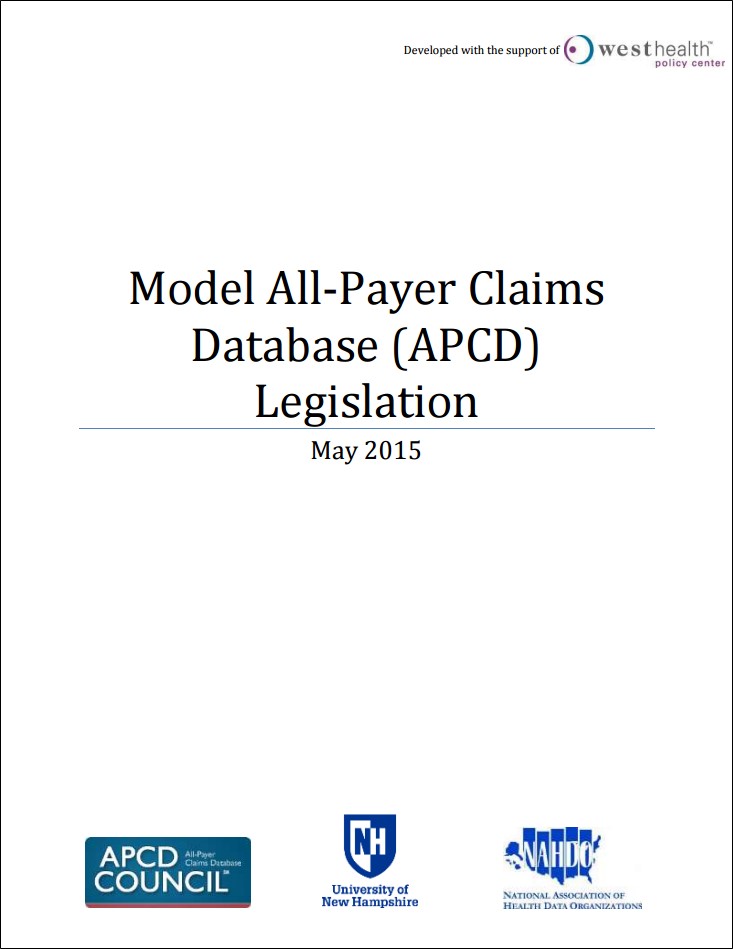APCD Development Efforts Intensify: States' Legislative Endeavors
 The APCD Council, with support from the Gary and Mary West Health Policy Center, has created model legislation guidance for states interested in developing all-payer claims database (APCD) programs. The document, which is based on a review of existing APCD legislation in 15 states, offers template language across key legislation sections for states to modify to reflect the specific intent and design of their prospective APCD programs and existing laws. To learn more about the “Model APCD Legislation” manual, please click here.
The APCD Council, with support from the Gary and Mary West Health Policy Center, has created model legislation guidance for states interested in developing all-payer claims database (APCD) programs. The document, which is based on a review of existing APCD legislation in 15 states, offers template language across key legislation sections for states to modify to reflect the specific intent and design of their prospective APCD programs and existing laws. To learn more about the “Model APCD Legislation” manual, please click here.
Reflecting the continued, strong interest on the part of state governments in building a unified data resource that supports important policy and program information needs, here are a few of the most recent legislative endeavors taken by states to establish APCD programs.
ARKANSAS
The state of Arkansas recently passed the Arkansas Healthcare Transparency Initiative of 2015 with the approval of Senate Bill 956, which became Act 1233 in April. The act will officially create a statewide APCD program in an effort to identify and explore key healthcare issues, questions, and challenges in the state that can be improved through more transparent information.
KENTUCKY
In October 2014, more than 60 leaders in Kentucky government, business, policy, and healthcare were convened by the Foundation for a Healthy Kentucky to discuss statewide strategies to increasehealthcare price transparency. A large portion of the discussion focused on the use and value of an APCD program in achieving its transparency goals. The Kentucky legislature has conducted studies on the possibility of enacting APCD legislation before (2013), although no bills are currently pending on the topic.
NEW MEXICO
Since the end of the 2015 legislative session, several health-related bills have been signed by New Mexico governor Susana Martinez. Of those bills, Senate Bill 323 — “Safe Disclosure of Certain Health Information” — has received the most attention for its goal of establishing a website where consumers can compare the cost of medical procedures at various hospitals around the state.
To inform the planned website, SB-323 envisions the construction of a “health information system” designed to advance the state’s efforts in collecting, analyzing, and disseminating health information. The end goals: assisting (a) the state’s performance of health planning and policymaking functions, (b) consumers in making informed health-related decisions, and (c) administrators in evaluating a statewide health plan.
Unfortunately, SB-578 – “All-Payer Claims Database Act”— which would have established a statewide APCD program, was postponed indefinitely by lawmakers at their legislative session in March.
OREGON
Oregon Senate president Peter Courtney recently killed a price transparency effort — Senate Bill 891— that would have required healthcare facilities in the state to publish online the billed charges for the 100 most common inpatient and outpatient services paid by health insurers, Medicare, Medicaid, the school districts, and state employees.
Another measure still in committee – SB-900 – would similarly develop a consumer website for the posting of healthcare price data for the state’s most common inpatient and outpatient hospital services. However, unlike SB-891 which would have forced the state’s healthcare facilities to independently publish online the billed charges for their healthcare services, providing their patients with an estimate of charges for a procedure (including all physician and facility fees), SB-900 would require the Oregon Health Authority to post the price information on the facilities’ behalf.
WASHINGTON
With strong support from the state’s businesses, healthcare providers, and patient organizations, Washington governor Jay Inslee signed legislation to establish a fully functional APCD program.Senate Bill 5084 will build on the state’s current APCD program, making it a requirement for all health insurers to submit their data. (Currently, participation in Washington’s APCD is voluntary.) With the expanded transparency bill, Washington also is planning to collect financial information in its APCD, which will allow for analyses about healthcare value — a feature not broadly available with the state’s existing voluntary design.